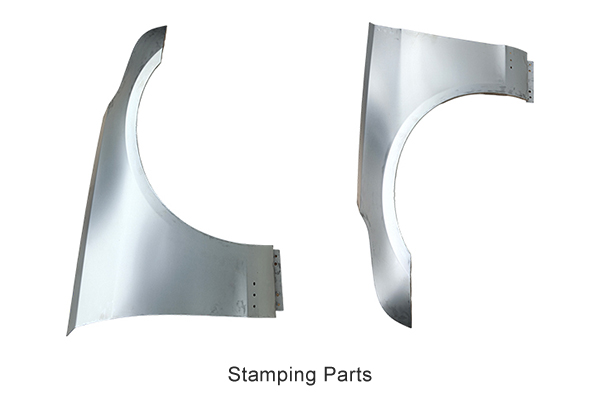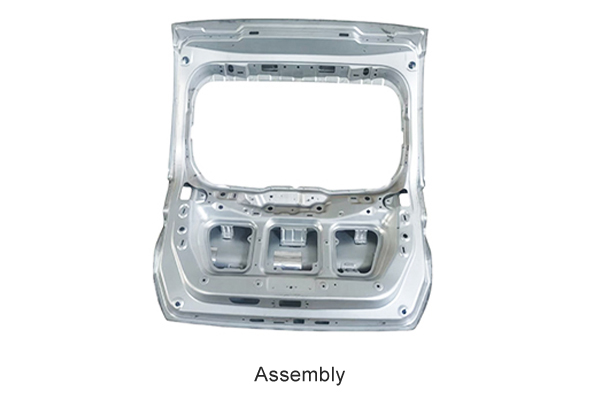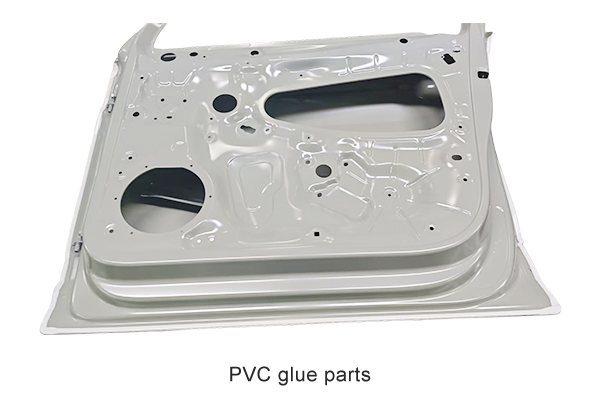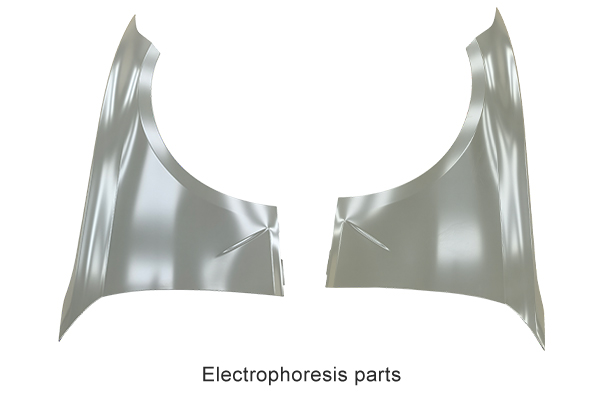What advanced manufacturing technologies are used in automobile cover hydraulic press processing to ensure high-precision and high-quality stamping parts?
Release Time : 2025-04-16
In the automotive manufacturing industry, the quality of automobile cover parts is directly related to the safety, aesthetics and market competitiveness of the whole vehicle. Therefore, the use of advanced manufacturing technology is essential to ensure high-precision and high-quality stamping parts. Automobile cover hydraulic press processing has improved production efficiency and economic benefits while meeting the above requirements through a series of innovative technologies and strict quality control measures.
First of all, modern automobile cover hydraulic presses are usually equipped with high-precision servo control systems. These systems can monitor and adjust key parameters such as pressure, speed and position in real time to ensure that each stamping cycle can meet the predetermined standards. For example, by using a closed-loop feedback mechanism, the servo control system can automatically adjust the output torque according to the actual working conditions, thereby maintaining consistent product quality. In addition, some high-end equipment also integrates high-resolution encoders and sensors, which can accurately measure displacement and acceleration, further improving positioning accuracy and response speed.
Secondly, advanced mold design and manufacturing technology is also one of the important factors to ensure the high quality of stamping parts. In order to improve production efficiency and reduce material waste, manufacturers are constantly exploring new design concepts and methods. For example, the use of computer-aided design (CAD) and computer-aided manufacturing (CAM) software for three-dimensional modeling and simulation analysis can identify potential problems and optimize them in the design stage. At the same time, the application of precision mold manufacturing technology has significantly improved the accuracy of the mold, and the tolerance range can be controlled at the micron level, greatly reducing the defective rate.
Furthermore, the progress of heat treatment and surface treatment technology has also provided strong support for improving the quality of stamping parts. By properly heat treating the raw materials, such as quenching and tempering, their mechanical properties, especially hardness and strength, can be significantly enhanced. For parts that require special surface properties, surface treatment can be performed by electroplating, painting or anodizing, which not only improves the appearance quality, but also enhances corrosion resistance and wear resistance.
It is worth noting that in terms of material selection, with the increasing demand for lightweight and high-strength materials in the automotive industry, hydraulic machining is also gradually adapting to the application of new materials. For example, new materials such as high-strength steel (HSS), advanced high-strength steel (AHSS) and aluminum alloys are widely used in the manufacturing process of automotive covers. In view of the characteristics of these materials, the hydraulic press is equipped with special forming processes and tools to ensure that the processing tasks of complex shapes can be completed without damaging the original properties of the materials.
In addition, the application of intelligent and automated technologies has also brought revolutionary changes to improving the quality and production efficiency of stamping parts. For example, by integrating industrial robots and visual inspection systems, functions such as automatic loading and unloading and online inspection can be realized during the stamping process, which not only improves work efficiency but also reduces errors caused by human factors. At the same time, the quality management system based on big data analysis and artificial intelligence algorithms can monitor and analyze production data in real time, detect abnormal situations in time and take corresponding measures to effectively prevent the occurrence of quality problems.
Finally, throughout the entire production process, a strict quality control system runs through. From raw material inspection to finished product sampling testing, every link strictly implements the internationally accepted quality management system. For example, by conducting multiple evaluations such as tensile strength testing and hardness testing on samples, the actual performance of the product can be fully understood, and potential problems can be discovered and improved in time. In addition, the professional after-sales service team also provides customers with a full range of technical support and solutions to help solve various problems encountered in practical applications.
In summary, by adopting advanced servo control systems, precision mold design and manufacturing technology, heat treatment and surface treatment technology, as well as intelligent and automated means, automobile cover hydraulic press processing can provide efficient, accurate and reliable production services in various application scenarios. Whether in the field of traditional fuel vehicles or new energy vehicles, it is an ideal choice to ensure the quality and performance of parts. With the advancement of technology and the application of new materials, we are expected to see more innovative products come out in the future, bringing users a more perfect use experience.
First of all, modern automobile cover hydraulic presses are usually equipped with high-precision servo control systems. These systems can monitor and adjust key parameters such as pressure, speed and position in real time to ensure that each stamping cycle can meet the predetermined standards. For example, by using a closed-loop feedback mechanism, the servo control system can automatically adjust the output torque according to the actual working conditions, thereby maintaining consistent product quality. In addition, some high-end equipment also integrates high-resolution encoders and sensors, which can accurately measure displacement and acceleration, further improving positioning accuracy and response speed.
Secondly, advanced mold design and manufacturing technology is also one of the important factors to ensure the high quality of stamping parts. In order to improve production efficiency and reduce material waste, manufacturers are constantly exploring new design concepts and methods. For example, the use of computer-aided design (CAD) and computer-aided manufacturing (CAM) software for three-dimensional modeling and simulation analysis can identify potential problems and optimize them in the design stage. At the same time, the application of precision mold manufacturing technology has significantly improved the accuracy of the mold, and the tolerance range can be controlled at the micron level, greatly reducing the defective rate.
Furthermore, the progress of heat treatment and surface treatment technology has also provided strong support for improving the quality of stamping parts. By properly heat treating the raw materials, such as quenching and tempering, their mechanical properties, especially hardness and strength, can be significantly enhanced. For parts that require special surface properties, surface treatment can be performed by electroplating, painting or anodizing, which not only improves the appearance quality, but also enhances corrosion resistance and wear resistance.
It is worth noting that in terms of material selection, with the increasing demand for lightweight and high-strength materials in the automotive industry, hydraulic machining is also gradually adapting to the application of new materials. For example, new materials such as high-strength steel (HSS), advanced high-strength steel (AHSS) and aluminum alloys are widely used in the manufacturing process of automotive covers. In view of the characteristics of these materials, the hydraulic press is equipped with special forming processes and tools to ensure that the processing tasks of complex shapes can be completed without damaging the original properties of the materials.
In addition, the application of intelligent and automated technologies has also brought revolutionary changes to improving the quality and production efficiency of stamping parts. For example, by integrating industrial robots and visual inspection systems, functions such as automatic loading and unloading and online inspection can be realized during the stamping process, which not only improves work efficiency but also reduces errors caused by human factors. At the same time, the quality management system based on big data analysis and artificial intelligence algorithms can monitor and analyze production data in real time, detect abnormal situations in time and take corresponding measures to effectively prevent the occurrence of quality problems.
Finally, throughout the entire production process, a strict quality control system runs through. From raw material inspection to finished product sampling testing, every link strictly implements the internationally accepted quality management system. For example, by conducting multiple evaluations such as tensile strength testing and hardness testing on samples, the actual performance of the product can be fully understood, and potential problems can be discovered and improved in time. In addition, the professional after-sales service team also provides customers with a full range of technical support and solutions to help solve various problems encountered in practical applications.
In summary, by adopting advanced servo control systems, precision mold design and manufacturing technology, heat treatment and surface treatment technology, as well as intelligent and automated means, automobile cover hydraulic press processing can provide efficient, accurate and reliable production services in various application scenarios. Whether in the field of traditional fuel vehicles or new energy vehicles, it is an ideal choice to ensure the quality and performance of parts. With the advancement of technology and the application of new materials, we are expected to see more innovative products come out in the future, bringing users a more perfect use experience.








